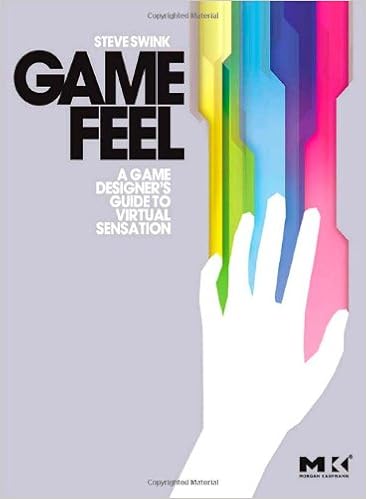
Free Game Feel: A Game Designer's Guide To Virtual Sensation (Morgan Kaufmann Game Design Books) Ebooks To Download

"Game Feel" exposes "feel" as a hidden language in game design that no one has fully articulated yet. The language could be compared to the building blocks of music (time signatures, chord progressions, verse) - no matter the instruments, style or time period - these building blocks come into play. Feel and sensation are similar building blocks where game design is concerned. They create the meta-sensation of involvement with a game. The understanding of how game designers create feel, and affect feel are only partially understood by most in the field and tends to be overlooked as a method or course of study, yet a game's feel is central to a game's success. This book brings the subject of feel to light by consolidating existing theories into a cohesive book. The book covers topics like the role of sound, ancillary indicators, the importance of metaphor, how people perceive things, and a brief history of feel in games.The associated web site contains a playset with ready-made tools to design feel in games, six key components to creating virtual sensation. There's a play palette too, so the desiger can first experience the importance of that component by altering variables and feeling the results. The playset allows the reader to experience each of the sensations described in the book, and then allows them to apply them to their own projects. Creating game feel without having to program, essentially. The final version of the playset will have enough flexibility that the reader will be able to use it as a companion to the exercises in the book, working through each one to create the feel described.

Series: Morgan Kaufmann Game Design Books
Paperback: 376 pages
Publisher: CRC Press; 1 edition (October 13, 2008)
Language: English
ISBN-10: 0123743281
ISBN-13: 978-0123743282
Product Dimensions: 7.4 x 0.9 x 9.1 inches
Shipping Weight: 1.8 pounds (View shipping rates and policies)
Average Customer Review: 4.5 out of 5 stars See all reviews (25 customer reviews)
Best Sellers Rank: #146,006 in Books (See Top 100 in Books) #18 in Books > Computers & Technology > Games & Strategy Guides > Game Design #54 in Books > Arts & Photography > Other Media > Digital #94 in Books > Computers & Technology > Games & Strategy Guides > Game Programming

First of all, this is not about haptics (literal 'feel', as in force feedback or other simulated touch) though haptics are touched on (har). It's about tuning the feel of a specific kind of game - the sort where your avatar, seen or unseen, becomes a virtual extension of your real self. This requires a certain tight feedback loop of repeated player input and game response that's fast enough that it becomes to some degree chunked and unconscious. Games like Super Mario 64, Half-Life, Burnout, and Geometry Wars all qualify. Civ IV and Starcraft, even though they're great games, don't qualify - the input is too far removed.It comes with a companion website, [...], and you are expected to follow along by downloading various example apps from the site at given points in the text and play with them. And they do add a huge amount to the book.I'm slightly conflicted by this book - Swink does a good job of laying out exactly what makes a good game feel right, but it's a bit too chatty and repetitive, and there is a lot it 'it should do x' without as much indication of how to do x as I would have expected. If you tinker with the provided example apps much of it will come into focus, though from a tuning side if not implementation side.I also didn't feel I learned a lot new till the end of the book, though it certainly helps to have it all laid out semi-rigorously as a checklist. On the other hand I've also played too many video games since Super Mario Bros where the designers obviously did NOT know this stuff, so I would highly recommend that anyone working in the game industry read this if you're not already Mark Cerny.
Game Feel: A Game Designer's Guide to Virtual Sensation (Morgan Kaufmann Game Design Books) Virtual Assistant: 101- How to Effectively Outsource Tasks to Virtual Assistants to Maximize your Productivity (Outsourcing, Virtual Assistant) Computer Organization and Design, Fifth Edition: The Hardware/Software Interface (The Morgan Kaufmann Series in Computer Architecture and Design) Computer Organization and Design: The Hardware/Software Interface (The Morgan Kaufmann Series in Computer Architecture and Design) Logical Effort: Designing Fast CMOS Circuits (The Morgan Kaufmann Series in Computer Architecture and Design) Relational Database Design Clearly Explained, Second Edition (The Morgan Kaufmann Series in Data Management Systems) Data Governance: How to Design, Deploy and Sustain an Effective Data Governance Program (The Morgan Kaufmann Series on Business Intelligence) Pocket Guide to TCP/IP Socket Programming in C (Morgan Kaufmann Series in Networking) The Non-Designer's Design Book (Non Designer's Design Book) MICO: An Open Source CORBA Implementation (The Morgan Kaufmann Series in Software Engineering and Programming) Applying Knowledge Management: Techniques for Building Corporate Memories (The Morgan Kaufmann Series in Artificial Intelligence) The Art and Science of Digital Compositing, Second Edition: Techniques for Visual Effects, Animation and Motion Graphics (The Morgan Kaufmann Series in Computer Graphics) Advanced Graphics Programming Using OpenGL (The Morgan Kaufmann Series in Computer Graphics) Mobile 3D Graphics: with OpenGL ES and M3G (The Morgan Kaufmann Series in Computer Graphics) Introduction to Data Compression, Second Edition (The Morgan Kaufmann Series in Multimedia Information and Systems) High-Performance Communication Networks, Second Edition (The Morgan Kaufmann Series in Networking) Foundations of Multidimensional and Metric Data Structures (The Morgan Kaufmann Series in Computer Graphics) Computer Networks, Fifth Edition: A Systems Approach (The Morgan Kaufmann Series in Networking) Knowledge Representation and Reasoning (The Morgan Kaufmann Series in Artificial Intelligence) Probabilistic Reasoning in Intelligent Systems: Networks of Plausible Inference (Morgan Kaufmann Series in Representation and Reasoning)



